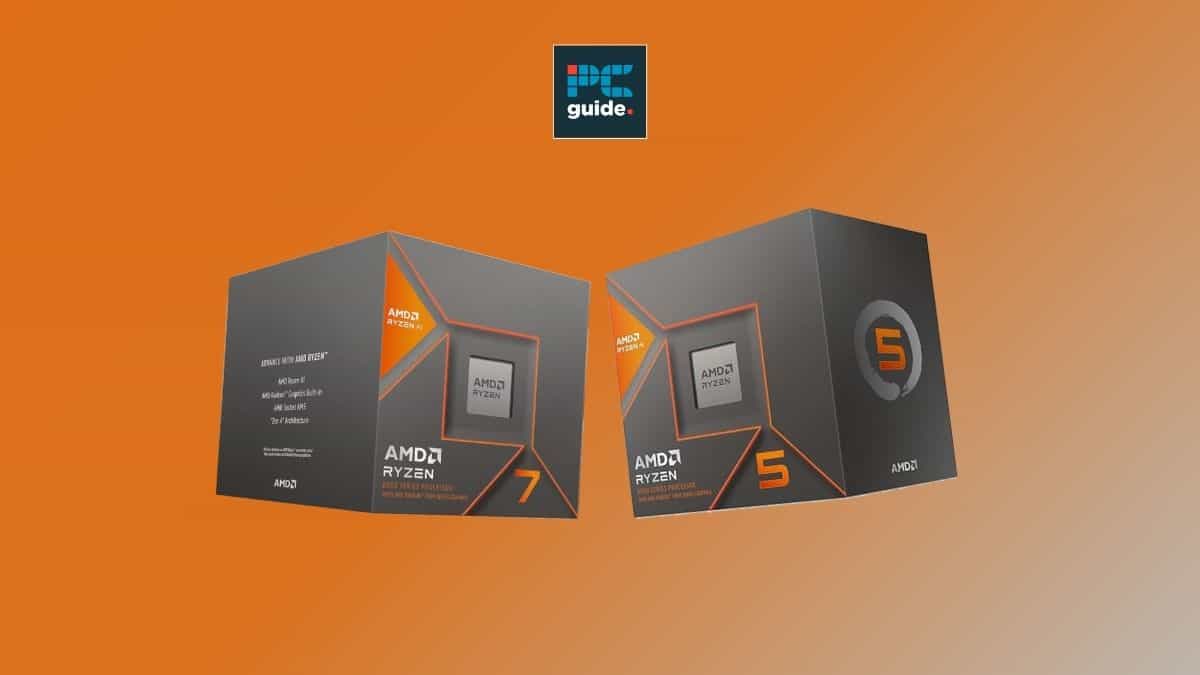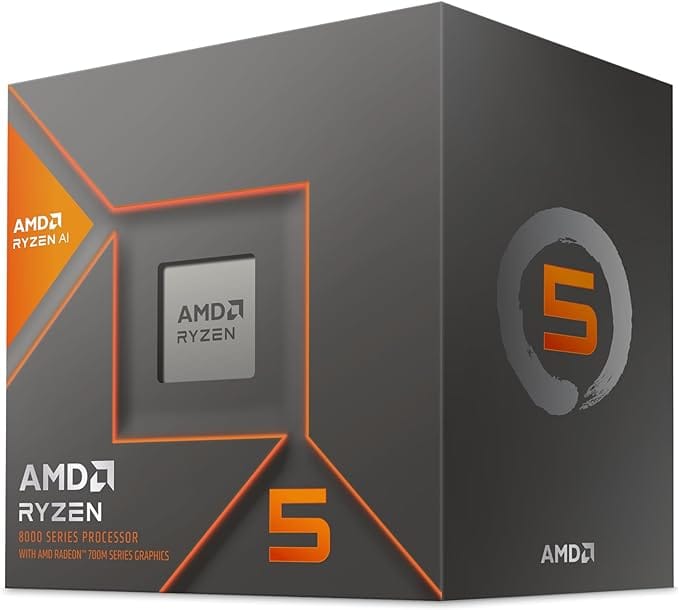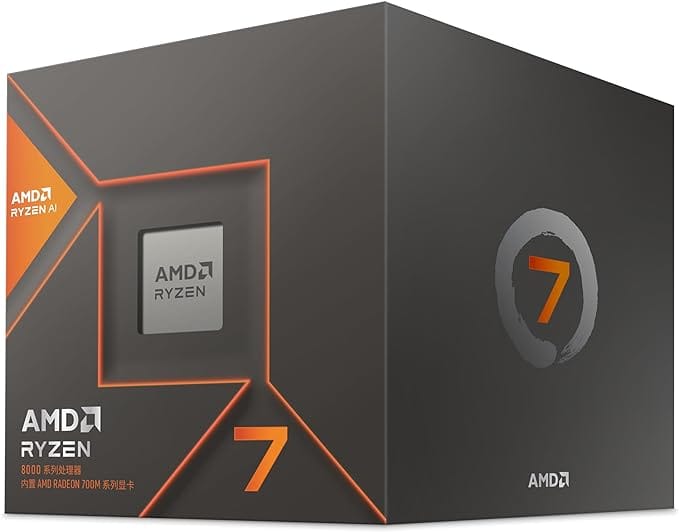AMD Ryzen 5 8600G vs Ryzen 7 8700G – Which works for you?

Table of Contents
Whether picking between desktop APUs or GPU, or between Radeon and the latest Ryzen, making the right choice is very important for gamers. Luckily, AMD offers a variety of options catering to different user needs and budgets – from entry-level up to more powerful options; usable in some games without the need for discrete graphics cards. The Ryzen 5 8600G and Ryzen 7 8700G are two of the recently launched AMD processors of the 8000G Series. Moreover, they both fall within the mid-range segment, offering a blend of performance and affordability. So which one works best for you? Let's delve deep into comparing AMD Ryzen 5 8600G vs AMD Ryzen 7 8700G to determine which might be better for you.
For more information on the AMD Ryzen 5 8600G, see our review round-up here. Anyway, let’s crack on with this article for now.
Prime Day is finally here! Find all the biggest tech and PC deals below.
- Sapphire 11348-03-20G Pulse AMD Radeon™ RX 9070 XT Was $779 Now $739
- AMD Ryzen 7 7800X3D 8-Core, 16-Thread Desktop Processor Was $449 Now $341
- ASUS RTX™ 5060 OC Edition Graphics Card Was $379 Now $339
- LG 77-Inch Class OLED evo AI 4K C5 Series Smart TV Was $3,696 Now $2,796
- Intel® Core™ i7-14700K New Gaming Desktop Was $320.99 Now $274
- Lexar 2TB NM1090 w/HeatSink SSD PCIe Gen5x4 NVMe M.2 Was $281.97 Now $214.98
- Apple Watch Series 10 GPS + Cellular 42mm case Smartwatch Was $499.99 Now $379.99
- ASUS ROG Strix G16 (2025) 16" FHD, RTX 5060 gaming laptop Was $1,499.99 Now $1,274.99
- Apple iPad mini (A17 Pro): Apple Intelligence Was $499.99 Now $379.99
*Prices and savings subject to change. Click through to get the current prices.
AMD Ryzen 5 8600G vs AMD Ryzen 7 8700G – Specs
The Ryzen 5 8600G and Ryzen 7 8700G share several fundamental specifications, including the AM5 socket, a 4nm processor size, and 25,000 million transistors. Additionally, both models are built on the Phoenix die with standard Zen 4 cores (as opposed to the more mainstream 7000 series’ Raphael architecture. However, where they diverge lies in their core architecture, hardware, and processing capabilities. Additionally, major differences between the 8600G and 8700G relate to the core and thread count, plus a different class of Radeon integrated graphics.
| Specifications | AMD Ryzen 5 8600G | AMD Ryzen 7 8700G |
|---|---|---|
| Socket | AM5 | AM5 |
| Processor size | 4 nm | 4 nm |
| Transistors | 25,000 million | 25,000 million |
| CPU Cores (Count) | 6 | 8 |
| Thread count | 12 | 16 |
| Frequency | 4.3 GHz | 4.2 GHz |
| PCIe | 4.0 | 4.0 |
| Base clock | 100 MHz | 100 MHz |
| Turbo boost clock | up to 5 GHz | up to 5.1 GHz |
| TDP | 65 W | 65 W |
| L1 cache | 64 KB (per core) | 64 KB (per core) |
| L2 cache | 1 MB (per core) | 1 MB (per core) |
| L3 cache | 16 MB (shared) | 16 MB (shared) |
| Price / MSRP | $229 | $329 |
The Ryzen 7 8700G boasts a higher core count, with 8 cores, compared to the Ryzen 5 8600G’s 6 cores. Additionally, the Ryzen 7 8700G supports 16 threads, while the Ryzen 5 8600G supports 12 threads. This difference in core count and threading capability directly impacts each processor’s multitasking and parallel processing performance.
The Ryzen 5 8600G features a slightly higher base clock of 4.3 GHz than the Ryzen 7 8700G’s 4.2 GHz. However, the Ryzen 7 8700G compensates with a higher turbo clock speed, capable of reaching up to 5.1 GHz compared to the Ryzen 5 8600G’s 5 GHz. These clock speed differentials can influence the responsiveness and speed of tasks, especially in single-threaded applications. Cache size also contributes to the efficiency of data retrieval and processing. Both processors feature a 64 KB L1 cache and a 1 MB L2 cache per core, ensuring rapid access to frequently used data. Additionally, they share a 16 MB L3 cache, enhancing overall system performance by reducing memory latency.
AMD Ryzen 5 8600G vs AMD Ryzen 7 8700G – Performance
Both of these CPUs incorporate RDNA 3 graphics, so you’ll certainly see an upgrade if switching from the previous generation 5000G series – those previous Zen APUs made use of the Vega architecture. In terms of performance benchmarks, the Ryzen 7 8700G outshines the Ryzen 5 8600G as a desktop processor, boasting higher scores in both single-core and multi-core performance tests. This translates to smoother and more responsive computing experiences, particularly in resource-intensive gaming and content creation tasks. However, as these are APUs with integrated graphics we wouldn’t expect them to encode at the level of a system using a separate graphics card. Here are the benchmark scores of both processors:
- AMD Ryzen 5 8600G Geekbench performance score for single-core performance is 2474
- AMD Ryzen 5 8600G Geekbench performance score for multi-core performance is 11453
- AMD Ryzen 7 8700G Geekbench performance score for single-core performance is 2716
- AMD Ryzen 7 8700G Geekbench performance score for multi-core performance is 14383
In real-world scenarios, the performance disparity becomes evident, with the Ryzen 7 8700G consistently delivering quality settings in terms of higher FPS and smoother gameplay experiences on platforms like Cyberpunk 2077, Far Cry 6, and Shadow of the Tomb Raider. While the Ryzen 5 8600G still performs well, it will likely have lower resolutions in graphically intensive environments. Unfortunately, neither the Ryzen 7 8700G and Ryzen 5 8600G offer world-beating AI performance
One of the most prominent advantages of the Ryzen 7 8700G lies in its CPU speed, which is approximately 30.23% faster than the Ryzen 5 8600G. With a clock speed of 8 x 4.2 GHz compared to the Ryzen 5’s 6 x 4.3 GHz, the Ryzen 7 8700G excels in tasks demanding rapid processing and multitasking capabilities. Performance of the AMD Ryzen 5 8600G and 7 8700G can be increased by by pairing it with an iGPU (integrated GPU).
AMD Ryzen 5 8600G vs AMD Ryzen 7 8700G – Price
Considering the price point, the Ryzen 5 8600G comes in at a more budget-friendly $229 on Amazon (from launch), making it an attractive option for users seeking performance without breaking the bank. On the other hand, the Ryzen 7 8700G commands a slightly higher price tag of $329, reflecting its enhanced performance capabilities and additional cores. With both products recently launched at CES 2024, expect prices to fluctuate for some time.
While there is a performance gap, with Ryzen 7 8700G being the winner, AMD Ryzen 5 8600G is very close in terms of value for price. Its $229 pricing is its biggest selling point, and that's what all the Ryzen 5 8600G reviews say.
Do you need a specific motherboard for the Ryzen 7 8700G?
Based on our findings, the best motherboard for a Ryzen 7 8700G is the affordable and feature-heavy ASUS Prime B650 Plus motherboard. This ATX motherboard offers high-speed wired networking through a Realtek 2.5Gb Ethernet controller, a PCIe 5.0 M.2 slot, and DDR5 support. This is also recommended for the AMD Ryzen 5 8600G.
Final verdict
Which one works for you depends on your requirements and preferences, but the 8000G series offers new options in the desktop market. If you want to build a PC with a very tight budget, either of these latest Zen 4 products is a solid option. The Ryzen 5 8600G will be the ideal choice for its affordable pricing. On the other hand, if you are ready to pay a slightly premium price for enhanced performance, we recommend going with the AMD Ryzen 7 8700G. The product is an excellent single-chip gaming solution for the majority of users. Bear in mind that the 8000G series includes iGPUs (similar to what you may see in mobile computing and laptops. But as desktop APUs, you still have the opportunity to add a graphics card for extra power in your setup.



